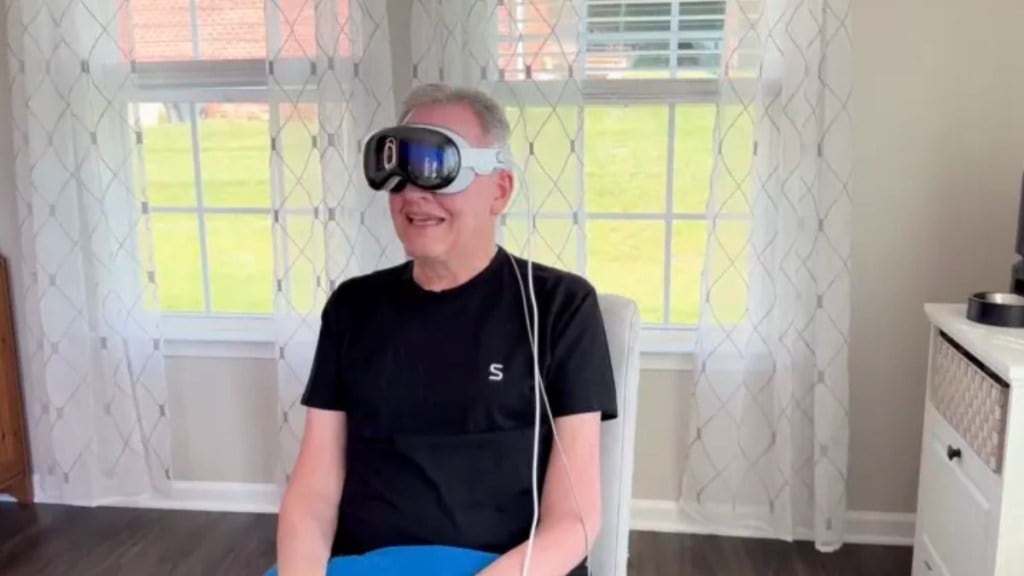After Apple launched Apple Vision Pro, Synchron, which is a Neurotech startup, has connected its brain implant to Apple’s Vision Pro headset.
According to sources, Synchron is building a brain-computer interface (BCI), designed to help patients with paralysis operate technology. Now, with BCI implemented on Apple’s Vision Pro, such patients can use smartphones and computers with their minds.
Synchron to work with Vision Pro
Synchron explained that the BCI will be implanted through the jugular vein, eliminating the need for invasive brain surgery. Once implanted, it will be able to detect and wirelessly transmit motor intent out of the brain. This can eventually enable users to control personal devices with hands-free point-and-click functionality.
Synchron, a neurotech startup, has successfully integrated its brain-computer interface (BCI) with Apple’s Vision Pro headset. This integration is believed to allow people with paralysis to control the device using only their thoughts. This breakthrough has the potential to mark a significant milestone in making advanced technology accessible to those with limited physical abilities.
Furthermore, Thomas Oxley, who is the CEO of Synchron, said that the company also plans to work on connecting BCI to headsets of other companies. He believes that this initiative is the beginning of a new therapeutic option to restore the ability to engage with digital technology that ‘we take for granted.’
AI controlling brain: Boon or Bane?
Earlier this year, Apple had released the Vision Pro. Apple Vision Pro can allow users to typically control devices with eye movements, voice commands and hand gestures. It is believed that Synchron has been working to make it accessible to patients who can’t speak or move their upper limbs. With the implementation of Synchron in Apple Vision Pro, it is now possible for patients with limited physical mobility to control the device using only their thoughts.
As reported by CNBC, Synchron highlighted that a 64-year-old patient named Mark has been pioneering the company’s work with the Vision Pro headset. Mark said in a statement that he’s been testing the Vision Pro intermittently since April, and he’s able to use it to send texts, play Solitaire and watch TV.
Reportedly, the company has implanted its BCI in six patients in the U.S. and four in Australia. However, it still needs approval from the U.S. Food and Drug Administration to commercialize its technology more broadly.
On Tuesday, Synchron said that the company is a part of an increasingly competitive BCI industry. It also claimed that it is the first to connect its system to Apple’s Vision Pro. As reported by CNBC, other companies such as Paradromics, Precision Neuroscience, Blackrock Neurotech and Elon Musk’s Neuralink are also developing BCI systems. However, their designs and ambitions all vary from that of Synchron. Synchron believes that it can make a mark in the field of Neurotech in the coming years.
Industry reacts
As Artificial Intelligence (AI) continues to expand its territory, this convergence of AI and neural interfaces can open up a world of possibilities and can also raise important questions. Creating an interface between technology and the human brain might be very exciting and potentially takes the application of AI to the next level from where we are today. However, this can have its own pros and cons.
If looked from a positive perspective, “ The integration of AI with brain-computer interfaces can empower individuals with paralysis to seamlessly interact with technology like Apple’s Vision Pro. This innovation is not just a testament to technological advancement but can be a profound step towards inclusivity, enhancing the quality of life for those with severe physical limitation,” Dhawal Jain, co-founder, Mave Health, explained.
“Every tech has a beneficial side and a dark side. There are privacy concerns due to unauthorised access to users’ thoughts and mental stress, which can create ‘brain spyware’. There are safety and health concerns, and concerns around ceding autonomy and agency to a technology,” Jaspreet Bindra, Founder, Tech Whisperer, said.
On the other hand, the initiative by Synchon can have loopholes. For example, “AI controlled brain implant can involve potential misuse of neural data. Also it can include security threats such as hacking or unauthorized control. Ethical issues such as consent, autonomy, and control are critical, along with the unknown long-term health effects,” Himanchal Gupta, Tech creator, highlighted.
Furthermore, “Implanting a BCI typically involves neurosurgery, which carries inherent risks such as infection, bleeding, and damage to brain tissue. If the long-term effects of having a device implanted in the brain are not fully understood, there may be risks related to device malfunction, wear and tear, or biocompatibility issues,” Utkarsh Sinha, managing director, Bexley advisor, concluded.
Follow FE Tech Bytes on Twitter, Instagram, LinkedIn, Facebook.








